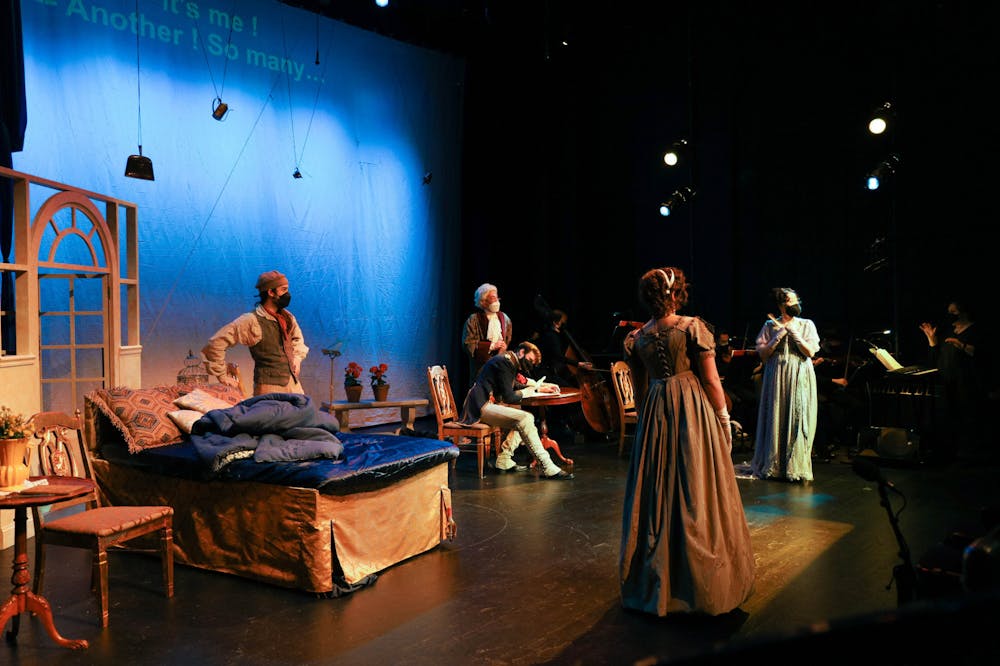After what has seemed like a never-ending dearth of live music and theater these past two years, live performances are finally returning. While livestreams and Zoom performances were certainly better than nothing, there really is nothing like sitting in an audience, watching a story come to life in the same room as you, feeling music reverberate throughout your body and just immersing yourself in a theatrical experience.
Now that the Peabody Institute is starting to perform live again for Hopkins affiliates, I was lucky enough to attend the Peabody Chamber Opera and Peabody Concert Orchestra’s final performance of La scala di seta on Feb. 19. La Scala di Seta, meaning “The Silken Ladder,” is a one-act comic opera composed by Gioachino Rossini with a libretto by Giuseppe Maria Foppa. Held at the Baltimore Theatre Project, this jovial production was a perfect reminder of just how engaging a live performance with a stellar cast and orchestra can be.
Set in France in the early 1800s, the opera follows the story of Giulia (Peabody graduate student Yoo Jin Lee) and her true love, Dorvil (Peabody alum Nathan Hawsey). Giulia is secretly married to Dorvil and lowers the titular silk ladder from her bedroom window every night to sneak him up unseen. This is all unbeknownst to her guardian and tutor, Dormont (Peabody graduate student Matthew Gavilanez), who has arranged for Giulia to marry a soldier, Blansac (Peabody graduate student John Arlievsky).
In order to thwart these plans and stay with Dorvil, Giulia devises a plan with Dormont’s servant, Germano (Peabody graduate student Kyle Dunn), to divert Blansac’s attention toward her younger cousin, Lucilla (Peabody undergraduate senior Gracie Shortridge). From there, all sorts of comical hijinks ensue.
Given that the opera was in Italian and the performers all wore masks, I initially wondered if it would be difficult to follow the plot. However, my worries were quickly dispelled, as both the English subtitles projected above the stage and the cast’s expressive performances were more than enough to convey the story in an engaging manner.
The Peabody Chamber Opera usually puts on productions with smaller casts and orchestras than Peabody’s mainstage productions, and this show was no exception. La Scala di Seta only has six roles, but as such, the entire cast at this performance (the show was double cast) was top-notch. Lee’s Giulia sang beautifully and held her own as the heroine of the show. Two other standouts were Hawsey’s Dorvil and Dunn’s Germano, whose facial expressions and comedic timing elevated the entire performance as they carried out their respective schemes.
One of my favorite aspects of this production was the physical humor. Throughout the opera, characters at various points hid under covers, behind folding screens and under tables to eavesdrop or shield their presence. At certain points, characters even found themselves sitting with the audience or taking up a cello to blend in with the orchestra. This created an immersive experience, breaking the fourth wall and giving me the sense that director Garnett Bruce knew just the playful and offbeat touch this opera would welcome.
The lighting and set designs were also quite creative. Simple but effective, the set pieces of Giulia’s bedroom created the perfect space for the characters to roam, and the teapots and teacups hanging from ropes in the background provided a whimsical feel to the scenery. As for the lighting, I liked that the light on the backdrop changed colors to fit the current mood of the scene. When two characters fought, the backdrop turned bright red; when Giulia sang lovingly to Dorvil, it turned back to a calm blue.
Along with the cast, there was not a weak link in the small but talented orchestra. The six-person string ensemble expertly played Rossini’s sweet and lively score, filling the room and helping to tell the story along with the cast’s soaring voices.
Throughout the entire performance, I could tell that both the cast and musicians were having fun, and that infectious energy found its way to the audience as well. While La Scala di Seta has sadly closed, if you are looking for an intimate but engaging operatic experience, I would highly recommend checking out the Peabody Chamber Opera’s future productions. Take advantage of the gift of live theater!





